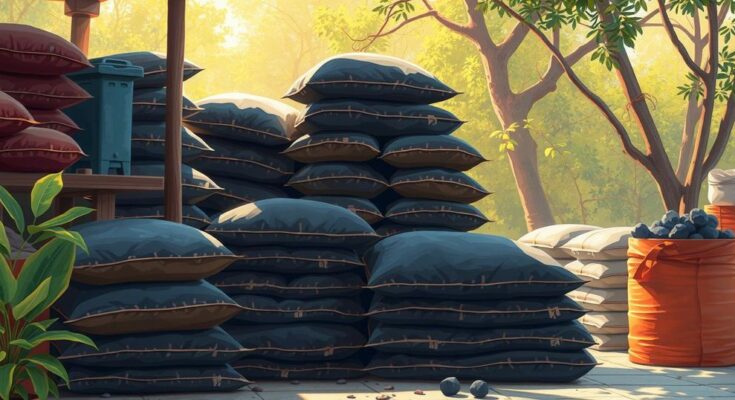Charcoal sales in Tanzania surged to Sh5.73 billion, a 100% increase from last year, as reported by the BoT, despite efforts to promote clean cooking energy. The growth underscores the demand for charcoal, although sales fell 39.30% from the previous quarter. Economic barriers impede the transition to clean energy, prompting calls for increased awareness and affordability measures.
The Bank of Tanzania (BoT) has reported a significant increase in charcoal sales, reaching Sh5.73 billion in the quarter ending September 2024, up from Sh2.94 billion the previous year. This 100% spike indicates a persistent demand for charcoal, even amidst efforts to promote clean cooking energy alternatives. However, there was a notable decline of 39.30% in sales from the previous quarter, indicating potential seasonal variations in consumption patterns.
In response to this upward trend in charcoal sales, stakeholders in the energy sector are advocating for initiatives aimed at reducing charcoal use. Recommendations include public awareness campaigns about clean energy options, addressing the costs of such sources, and enhancing their availability. Tanzania aims for 80% of its population to utilize clean cooking energy by 2034, focusing particularly on the promotion of cooking gas through the distribution of gas cylinders.
The report highlights regional disparities in charcoal sales, with the South-Eastern zone leading at Sh3.68 billion, representing 64.22% of total national sales. The Central region followed with Sh856.6 million, while the Northern, Lake, and Dar es Salaam zones had lower sales figures. An economist from the University of Dodoma, Dr. Lutengano Mwinuka, noted that limited access to clean energy in rural areas necessitates the promotion of energy-efficient stoves and alternative energy solutions such as biomass and agricultural waste, which can mitigate the environmental impact of charcoal production.
Dr. Mwinuka emphasized the need for inclusive initiatives that extend beyond urban settings, addressing challenges faced by rural communities in transitioning to cleaner energy. Dr. Donald Mmari from Repoa reiterated this perspective, highlighting the inadequacy of awareness campaigns in reaching rural areas and the necessity of ensuring that alternative energy sources are both accessible and affordable.
Economist Prof. Aurelia Kamuzora suggested that research be conducted to evaluate Tanzanians’ financial capabilities to ensure that gas prices are in line with economic conditions. She stated, “Charcoal is still seen as a more affordable option compared to gas,” highlighting high gas costs as a barrier to transition. Prof. Kamuzora also proposed studying urban food vendors to identify the most economical energy source for their needs, warning that high refill costs could drive users back to charcoal.
Going forward, Dr. Mmari called for initiatives to improve affordability and availability of alternative energy, particularly in rural areas, by optimizing transportation and production costs. Dr. Mwinuka reinforced the need to review gas pricing policies to encourage widespread adoption of cleaner energy solutions by making them financially viable for all populations.
The recent rise in charcoal sales in Tanzania underscores the challenges faced in transitioning to clean cooking energy. While stakeholders propose measures to reduce reliance on charcoal, such as awareness campaigns and improving accessibility to alternative energy sources, economic factors remain a significant barrier. A holistic approach addressing pricing policies and regional disparities is crucial for fostering the adoption of cleaner energy solutions across both urban and rural communities in Tanzania.
Original Source: www.thecitizen.co.tz




